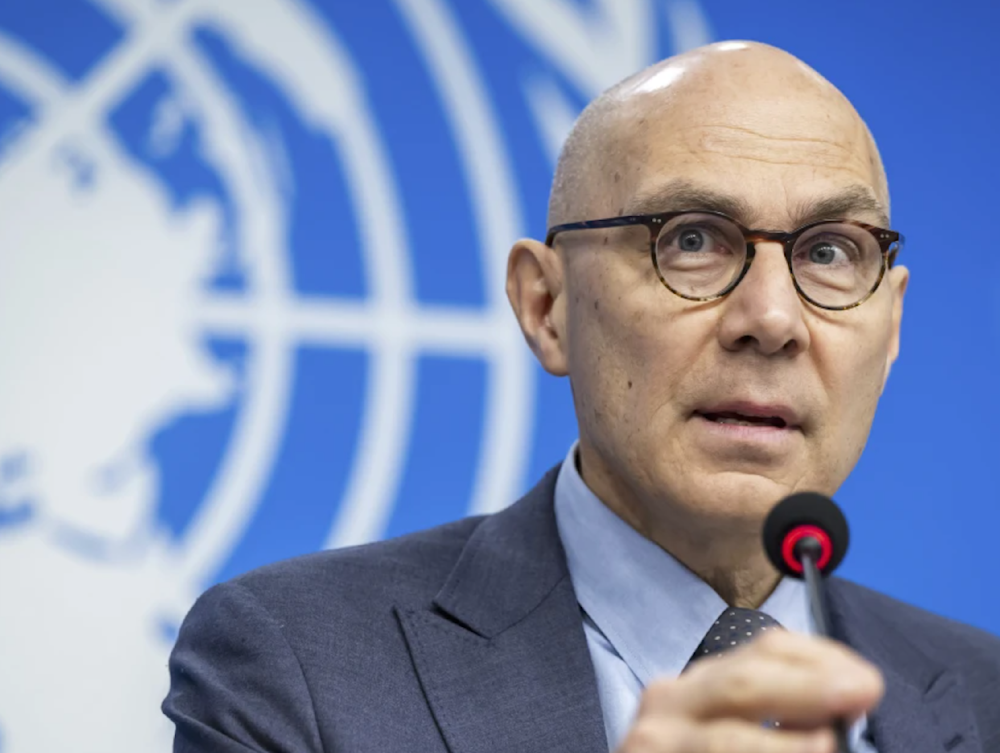Turk on Israeli strike on Doha: 'Assault on regional peace, stability'
UN High Commissioner Volker Türk condemns "Israel’s" airstrike on Hamas negotiators in Doha as a "shocking breach of international law" and an attack on Qatar’s sovereignty.
-

UN High Commissioner for Human Rights Volker Turk speaks during a press conference about the publication of the UN Human Rights fact-finding report on Bangladesh protests at the EU headquarters of the UN in Geneva, Switzerland, on February 12, 2025 (AP)
United Nations High Commissioner for Human Rights Volker Turk has condemned "Israel’s" airstrike on a delegation of Hamas negotiators in Doha on September 9, calling it a “shocking breach of international law” and a direct assault on regional peace and global mediation efforts.
Violation of Qatar's sovereignty
Addressing the Human Rights Council in Geneva, Turk stated that the attack was a “flagrant violation of the sovereignty and territorial integrity of Qatar,” echoing the condemnation expressed by the UN Secretary-General and Security Council members.
He emphasized that the strike violated international human rights law, particularly the right to life, as well as the foundational principles of international humanitarian law.
“Targeting parties engaged in internationally supported mediation on its territory undermines Qatar’s key role as a facilitator and peace broker,” Turk said, adding, “It is an attack on global efforts to resolve conflicts peacefully.”
Attack undermines global mediation, peace efforts
Turk urged the Council and all governments to reaffirm the importance of mediation processes and demand accountability for unlawful killings. He underscored that such attacks are not only violations of legal norms but also destabilize peace efforts far beyond the region.
“The rules of war, which govern every party to armed conflict, were agreed over decades for the common good,” he noted. “An attack may never be targeted at civilians who are not taking a direct part in hostilities.”
The High Commissioner stressed that the delegation targeted in Doha was actively negotiating a ceasefire, making the strike particularly damaging to peace prospects in Gaza, the occupied West Bank, Lebanon, Syria, Yemen, and the broader region.
Turk highlights broader pattern of violations in Gaza
The Doha strike coincided with other developments that, Turk argued, are dismantling the possibility of a "two-state solution". On the same day, "Israel" issued a displacement order for approximately one million people to leave Gaza City, without guaranteeing their safety.
“This is another blatant contravention of international humanitarian law,” he said.
In parallel, "Israel’s" government formally approved the so-called E1 project near al-Quds, which Prime Minister Benjamin Netanyahu described as fulfilling a promise to prevent the creation of a Palestinian state. Turk described the move as “another illegal fact on the ground,” pushing the region further away from a peaceful resolution.
UN urges accountability and action from member states
The High Commissioner acknowledged the suffering of all civilians affected by the war. “War without laws means a future of endless cruelty and suffering for civilians, both Palestinian and Israeli,” he warned.
Turk stressed that member states have a legal and moral obligation to act, detailing that the flow of arms to "Israel" must stop and maximum pressure must be applied for a ceasefire and the release of Israeli captives and Palestinian prisoners, and that the entry of humanitarian aid must be sufficient.
"I urge them to do everything possible to support the right to self-determination for the Palestinian people.”
He concluded by commending those nations already leading by example and reaffirmed the UN’s continued presence on the ground, providing aid and documenting violations, despite the loss of hundreds of its own personnel.

 3 Min Read
3 Min Read










